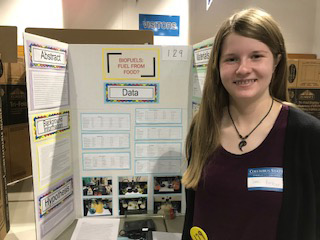Biofuels: Fuel from Food?
Which type of sugar (glucose or sucrose) can produce the most ethanol (greatest ethanol percent) through the fermentation and distillation of different food products (corn syrup, strawberry, molasses, corn, and soybeans)?
Student
Sage Parker
School
Olentangy Shanahan Middle School
Supporting files
biofuels-fuel-from-food.docx

The question for this experiment was which type of sugar (glucose or sucrose) can produce the most ethanol (greatest ethanol percent) through the fermentation and distillation of different food products (corn syrup, strawberry, molasses, corn, and soybeans)? The hypothesis was if different food products have either glucose, sucrose or both sugars combined, then the fermented and distilled food-based products which contain sucrose (molasses) will produce the most ethanol because sucrose (molasses) is a disaccharide-based sugar which means it has two monosaccharides molecules bonded. The hypothesis is supported because according to the data collected it shows the corn syrup (glucose) had produced an average ethanol percent of 23.722%. Strawberries (both sugars) produced an average ethanol percent of 11.062%. Corn (glucose) produced an average of 9.56% ethanol. Soybeans (both sugars) had 3.247% for trial A and the remaining trials were not attempted because the soybean beaker (trial A) exploded leaving the rest of the experiment too dangerous to finish. Thus, molasses had the greatest average percent of ethanol of 74.445% for the experiment, which shows my hypothesis is correct because the molasses trial average has produced better ethanol than the other foods tested. Something I learned during the experiment is sucrose is a disaccharide sugar molecule and that different food sources have different sugars which result in different qualities of ethanol that can be produced. A question for further inquiry is how can we use biofuels today and in the future to help the United States with non-renewable fueling issues?